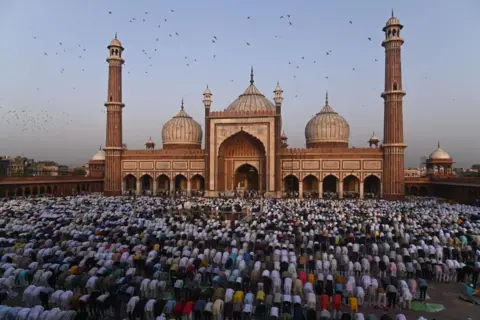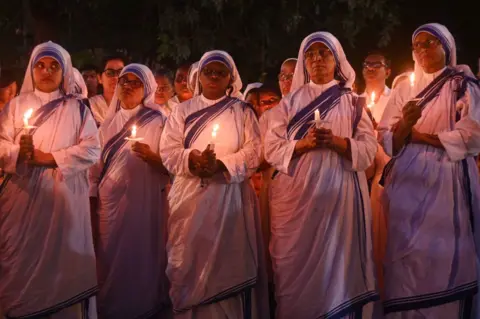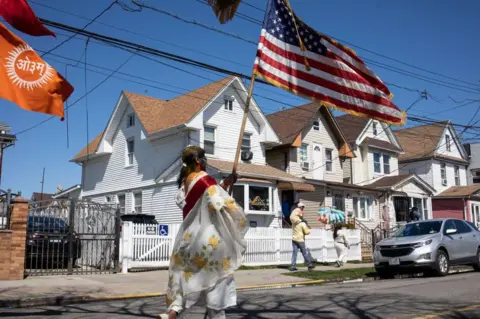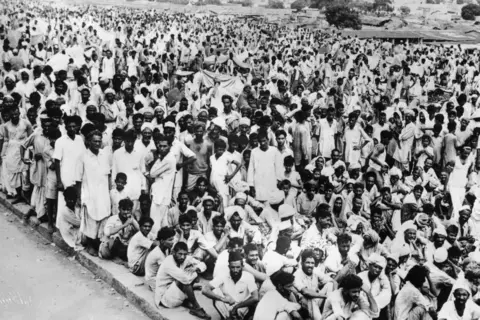 Getty Images
Getty ImagesThe religious composition of Indians who emigrate differs significantly from those who stay in India, analysis by the US-based Pew Research Center has found.
About 80% of people in India are Hindu, but they form only 41% of emigrants from the country, the survey on the religious composition of the world’s migrants says.
In contrast, about 15% of people living in India are Muslim, compared with 33% of those who were born in India and now live elsewhere.
Christians make up only about 2% of the Indian population, but 16% who have left India are Christian.
 Getty Images
Getty Images“Many more Muslims and Christians have left India than have moved there. People of other, smaller religions, like Sikhs and Jains, are also disproportionately likely to have left India,” Stephanie Kramer, a lead researcher of the analysis, told me.
More than 280 million people, or 3.6% of the world’s population, are international migrants.
As of 2020, Christians comprised 47% of the global migrant population, Muslims 29%, Hindus 5%, Buddhists 4% and Jews 1%, according to Pew Research Center’s analysis of UN data and 270 censuses and surveys.
The religiously unaffiliated, including atheists and agnostics, made up 13% of global migrants who have left their country of birth.
The migrant population in the analysis includes anyone living outside their birthplace, from babies to oldest adults. They could have been born at any time as long as they are still alive.
As far as India is concerned, the analysis found that the religious make-up of the population who have moved to India is much more similar to that of the country’s overall population.
 Getty Images
Getty ImagesAlso, Hindus are starkly under-represented among international migrants (5%) compared with their share of the global population (15%). There are about one billion Hindus around the world.
“This seems to be because Hindus are so concentrated in India and people born in India are very unlikely to leave,” said Ms Kramer.
“More people who were born in India are living elsewhere than from any other country of origin, but these millions of emigrants represent a small fraction of India’s population.”
About 99% of Hindus lived in Asia back in 2010, almost entirely in India and Nepal, and researchers say they wouldn’t expect that share to drop much, if at all.
Since partition, India hasn’t experienced a mass migration event, and many of those who migrated then are no longer alive.
“In contrast, other religious groups are more dispersed globally and face more push factors that drive emigration,” Ms Kramer said.
 Getty Images
Getty ImagesSo are Hindus some sort of a global outlier in this respect?
Researchers say Hindus do stand out in comparison to the other religious groups analysed.
“They’re less likely to leave home than people of other faiths, and their global migration patterns mostly depend on who leaves and arrives in India, rather than a broad collection of countries like other major religions,” says Ms Kramer.
The analysis found that Hindus have the longest average migration distance of 4,988km (3,100 miles), often moving from India to distant places like the US and the UK.
Researchers attribute this to the lack of recent crises forcing Hindus to flee to nearby countries. Instead, most are economic migrants seeking job opportunities, often in distant locations.
India certainly isn’t unique in having an emigrant population with a religious make-up different from those still living in the country.
Hindus are over-represented among emigrants from Bangladesh, according to the survey.
The study estimates that fewer than 10% of residents of Bangladesh are Hindu but 21% of the people who have left Bangladesh are Hindu.
 Getty Images
Getty ImagesAround 90% of people living in Bangladesh are Muslim, but 67% of emigrants from Bangladesh are Muslim.
Hindus make up only about 2% of Pakistan’s population, and 8% of people who were born in Pakistan and now live elsewhere are Hindu.
Myanmar has a lower percentage of Muslims in its population of residents compared with its emigrant population. Muslims make up about 4% of Myanmar’s resident population and 36% of its emigrant population.
Clearly, Muslims also migrate out of majority-Muslim countries. But religious minorities in those countries often migrate more.
So what does the Pew report broadly reveal about the religious composition of the world’s migrants?
“We find that people often go to places where their religion is common, and that those from minority religious groups within their country of birth are more likely to leave,” says Ms Kramer.




